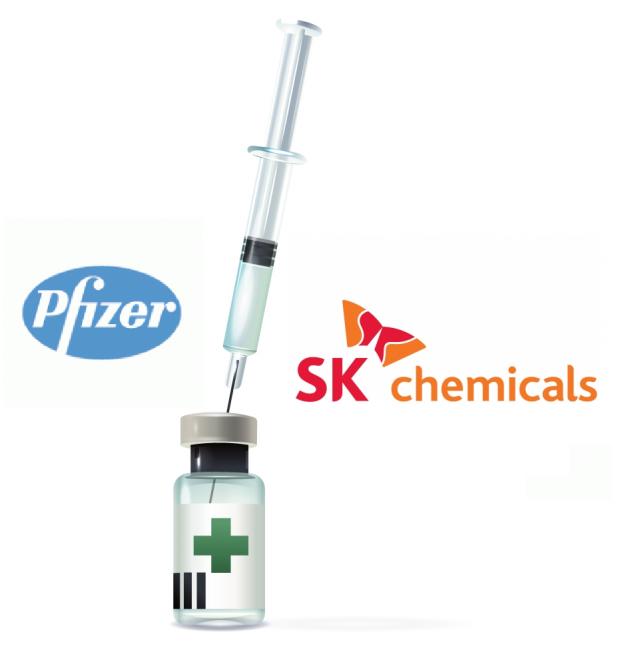Results from a patent dispute between SK Chemicals and Pfizer will be released soon, an aid group said Monday.

The results will play a crucial role in whether the Korean pharmaceutical will be able to launch the first domestically produced PCV13 vaccine, SKYPNEUMO, in the market.
SK Chemicals and Pfizer are locked in a patent dispute that spans back to 2013. Five years ago, the pharmaceutical unit of the Korean conglomerate SK Group filed a suit against Pfizer, aiming to invalidate its pneumococcal vaccine patent for “lacking novelty and the inventive step.”
The move was cited by experts as SK Chemicals’ efforts to break into a market where two pharma giants – Pfizer and GlaxoSmithKline – hold rights to the only two pneumococcal vaccines produced in the world.
In 2015, the Intellectual Property Trial and Appeal Board dismissed SK Chemicals' case, recognizing “the novelty, inventive step, and effectiveness of Pfizer’s (composition of matter) patent.”
Following the court’s decision, SK Chemicals filed an appeal. It believed the verdict “unreasonable,” considering the EU court revoked the same patent from Pfizer, according to local reports.
On the heels of winning the trial, Pfizer filed a patent infringement injunction against SK Chemicals in 2015. The patent court dismissed Pfizer’s case, saying SK Chemicals did not infringe on its patents. Pfizer filed for an appeal – within three days – and the case is still ongoing.
SK Chemicals has not yet launched SKYPNEUMO in the market, although it gained the Ministry of Food and Drug’s safety approval last year to be used for people over 50. The experts said the patent fight is a crucial reason.
Pfizer claims about an 80 percent market share in Korea with Prevnar 13. Its revenue in 2015 totaled around 66.2 billion won ($6.02 million), according to IMS Health. No other companies may make cheaper versions of the vaccine until March 2026 – when Pfizer’s Prevnar 13 patent expires.
The experts have also noted that overturning the 2015 patent ruling will be pivotal for not just SK Chemicals but also other possible domestic vaccine producers. The case may serve as a supporting case for the other litigations taking place in other countries.
Winning the patent case will not solve all obstacles SK Chemicals faces in launching the product, they say, as SKYPNEUMO is not indicated for infants and children.
Around 80 percent of Prevnar 13 revenue come from vaccinations on infants and children, according to IMS Health. The government has pushed a national immunization program for children to get pneumonia vaccinations since 2014.
Meanwhile, Pfizer is being challenged in multiple countries over the same patent.
Médecins Sans Frontières (MSF) challenged Pfizer in the High Court of Delhi in India Tuesday to overturn a ruling that granted Pfizer a “monopolistic” control over Prevnar 13. MSF has voiced its strong opposition to Pfizer’s hold on the pneumonia vaccine, claiming the company sets prices and deprives thousands of opportunities to be vaccinated.
■ Related : Doctors Without Borders contests Pfizer’s patent on pneumonia vaccine
Pneumonia kills around 2,500 kids a day, it said.
In Korea, MSF submitted an independent third-party amicus curia in April to contest Pfizer’s patent, alongside SK Chemicals.
Pfizer said in response that it advocates the importance of patents citing the complexity of manufacturing vaccines while remaining committed to the broadest deployment of the vaccine throughout the world.
“While we cannot comment on any ongoing patent hearing, Pfizer believes that meaningful patent protection is vital. It encourages medical progress, further investment into discovery and development of newer and effective medicines and vaccines that address unmet medical needs of patients in India and across the world,” the company said in a statement. “We believe that patents are not a barrier to access.”

